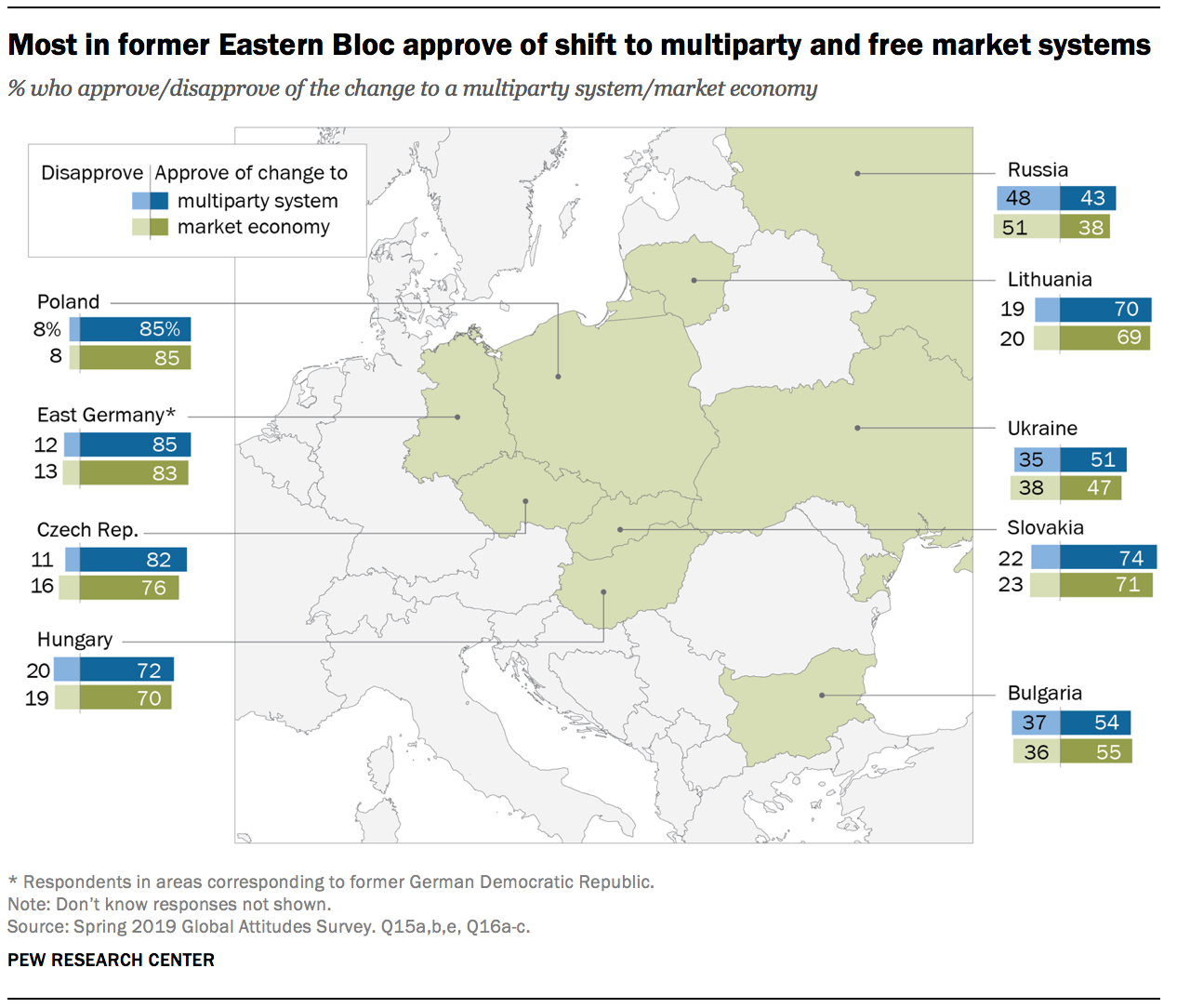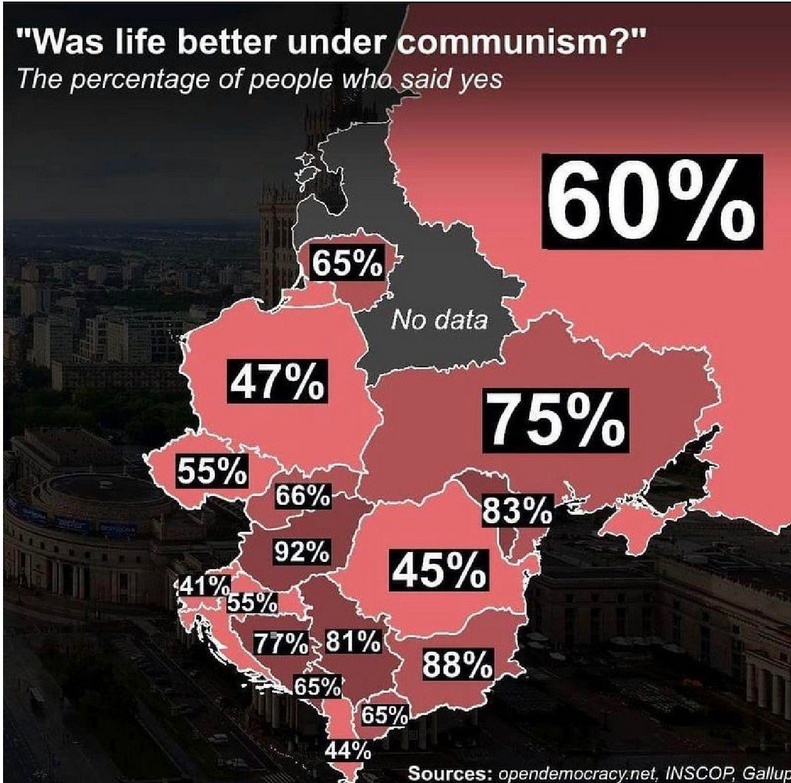There were no actual efforts to establish communism in eastern europe. Only autocratic regimes backed by soviet russia.
I’m no too learned in the subject but what would “true” communism even look like on the large scale like a country? Would it even be feasible?
True communism in a country is impossible.
You can have socialism, or anarchy, which we’ve seen before, but communism cannot function in one country alone, unless said country is completely and absolutely self reliant.
A major part of communism is internationalism, which is why socialist countries had the Comintern. (Communist International). Besides a political/social system, communism has a strong basis as an economic system. You can’t apply communist economic system principles to the capitalist market.
To my knowledge, no existing country is self reliant to the point that they can completely cut off trade with the rest of the world. USSR didn’t do it, China didn’t do it and they were the two biggest countries at the time.
That, of course is all a very surface level ELI5, and if you want to ask something more specific or in depth, feel free to.
Unless you’re an ultra-orthodox marxist, there is no such thing as trüe communism™.
There always have been many different ideas what „communism“ is, e.g. there have been various „nationalist communist“ ideologies (complicated by the fact that the Russian SFSR called everything „nationalist“ that wasn’t 100% aligned with its ideas of the Soviet Union, e.g. Hungary).
There are also no clear boundaries between communism, socialism, and anarchism, e.g. Kropotkin with his theories of anarchist communism.
That being said, I don’t think communism is a system (either social or economic), it’s strictly an idealogy, meaning it’s a way to achieve something, i.e. the classless and stateless society. If you follow that thought to its logical end, you cannot even „achieve“ communism at all, since at this point e.g. the proletariat ceases to exist, and as a result you cannot have a „dictatorship of the proletariat“.
It’s… complicated.
It’s doable if we all become Borg, but not really otherwise
And here comes the guy who thinks he can do it better, this time without mass killings.
Implying capitalism does not regularly do mass killings.
The US political spectrum is leaning so far to the right. A US left is a France center or moderate right. So what Americans consider communism is merely what French consider moderate leftist.
- I’m French living in the US
McCarthy propaganda go brrrr
Also a terrible person. The world’s big enough for there to be many terrible people in it. You need to create a very robust bureaucracy to keep corruption out and maintaining one is a very unglamorous job. Revolutionaries rarely have that skill set.
Almost like we need a large state apparatus…
counterpoint and some reading material for capitalism stans on here https://ia800309.us.archive.org/26/items/fp_Killing_Hope-US_Military_and_CIA_Interventions_Since_WWII-William_Blum/Killing_Hope-US_Military_and_CIA_Interventions_Since_WWII-William_Blum.pdf

Based comrade
Educated people in general have to say on politics the same things that I said earlier, but they are very nostalgic over less criminalized popular culture, better technical education and rules being followed. So am I to some extent actually.
In Moscow? You’re not being fair. Educated people in the soviet union from Moscow lived extremely well and have very positive views. Engineers, scientists, etc will all say positive things. You know as well as I do that hundreds of video interviews will confirm this. Be fairer, claiming that everyone that supports the ussr among the over 60s is just uneducated is definitely untrue. This particular video series is in Moscow and this lady is exactly what I am talking about.
You can’t live in Moscow and say this is untrue. You’re being unfair.
No recollection at all, I’m 1996, but since transition from USSR to modern Russia didn’t happen in an instance, in various institutions and organizations you can still see in some ways how it was. More in my childhood than now, but still.
Brought up in shock therapy then.
if you weren’t in denial.
I’m not in denial. I’m asking you to be fairer. The data does not support your position. You know as well as I do that 75% of the country consider the soviet era to be when the country was at its greatest (and that this is easily verifiable from many sources), and you know damn well that 75% of the country aren’t all uneducated people. You are not being fair.
Educated people in general have to say on politics the same things that I said earlier, but they are very nostalgic over less criminalized popular culture, better technical education and rules being followed. So am I to some extent actually.
In Moscow? You’re not being fair. Educated people in the soviet union from Moscow lived extremely well and have very positive views. Engineers, scientists, etc will all say positive things. You know as well as I do that hundreds of video interviews will confirm this. Be fairer, claiming that everyone that supports the ussr among the over 60s is just uneducated is definitely untrue. This particular video series is in Moscow and this lady is exactly what I am talking about.
You can’t live in Moscow and say this is untrue. You’re being unfair.
No recollection at all, I’m 1996, but since transition from USSR to modern Russia didn’t happen in an instance, in various institutions and organizations you can still see in some ways how it was. More in my childhood than now, but still.
Brought up in shock therapy then.
if you weren’t in denial.
I’m not in denial. I’m asking you to be fairer. The data does not support your position. You know as well as I do that 75% of the country consider the soviet era to be when the country was at its greatest (and that this is easily verifiable from many sources), and you know damn well that 75% of the country aren’t all uneducated people. You are not being fair.
7 out of 11 countries believe the end of the USSR harmed their countries rather than benefited them
Reflecting back on the breakup of the Soviet Union that happened 22 years ago next week, residents in seven out of 11 countries that were part of the union are more likely to believe its collapse harmed their countries than benefited them. Only Azerbaijanis, Kazakhstanis, and Turkmens are more likely to see benefit than harm from the breakup. Georgians are divided.
Hungary: 72% of Hungarians say they are worse off today economically than under communism
A remarkable 72% of Hungarians say that most people in their country are actually worse off today economically than they were under communism. Only 8% say most people in Hungary are better off, and 16% say things are about the same. In no other Central or Eastern European country surveyed did so many believe that economic life is worse now than during the communist era. This is the result of almost universal displeasure with the economy. Fully 94% describe the country’s economy as bad, the highest level of economic discontent in the hard hit region of Central and Eastern Europe. Just 46% of Hungarians approve of their country’s switch from a state-controlled economy to a market economy; 42% disapprove of the move away from communism. The public is even more negative toward Hungary’s integration into Europe; 71% say their country has been weakened by the process.
Romania: 63% of the survey participants said their life was better during communism
The most incredible result was registered in a July 2010 IRES (Romanian Institute for Evaluation and Strategy) poll, according to which 41% of the respondents would have voted for Ceausescu, had he run for the position of president. And 63% of the survey participants said their life was better during communism, while only 23% attested that their life was worse then. Some 68% declared that communism was a good idea, just one that had been poorly applied.
Germany: more than half of former eastern Germans defend the GDR
Glorification of the German Democratic Republic is on the rise two decades after the Berlin Wall fell. Young people and the better off are among those rebuffing criticism of East Germany as an “illegitimate state.” In a new poll, more than half of former eastern Germans defend the GDR.
28 percent of Czechs say they were better off under the Communist regime
Roughly 28 percent of Czechs say they were better off under the Communist regime, according to a poll conducted by the polling institute SC&C and released Sunday.
81% of Serbians believe they lived best in Yugoslavia
A poll shows that as many as 81 per cent of Serbians believe they lived best in the former Yugoslavia -”during the time of socialism”.
The majority of Russians polled in a 2016 study said they would prefer living under the old Soviet Union and would like to see the socialist system and the Soviet state restored.
The above memes are almost always made by Americans, whose brains are riddled with red scare brainworms and are completely devoid of any knowledge or understand of what the left thinks in Europe because Americans do not have a left.
Hungarian here. We had ten good years, then the same ruling class started to do the same shit they did back then but under a different name. But at least nowadays you can leave the country, which many do since – the frequent attempts to do so were an important cultural touchstone here in the 45 years of soviet occupation.
Trust me, no one wants the same shit back, that’s just a political talking point propping up Orbán’s pro-russian bullshit.
Of course nobody wants the same shit, I don’t want the same shit either, I know for sure that the hard left of mszp sit around where I am. Things can be so much better.
They did lead our last good government. And yes, I’d like that too, I voted for the coalition they were in in every election since I had the right to vote. I’m just saying that things being better is not the same as reinstating the same regime we had under the soviets, that would be pretty universally things going worse.
We’re in a failing capitalist system, but it still manages to be less oppressive than the failing socialist/communist/call it whatever you want system we had before.
Just wait until climate collapse hits and the food supply goes through cascading failures creating famines affecting 6 billion people. Then we’ll see when shit really hits the fan.
russian spy says what?
These polls are really out of date. These numbers have since improved substantially in capitalism’s favour.
These polls are really out of date. These numbers have since improved substantially in capitalism’s favour.
Feel free to give citations that are better than 2010-2016 lmao.
According to the absolute majority of respondents (54%), the majority of Hungarians had a better life under the Kádár regime (pre-1990) than today
The Kádár regime was the communist government.
there were even more respondents (61%) who said that the conditions for individual financial prosperity were more favorable under the Kádár regime.
lol
It is also worth noting that almost two-thirds of Hungarians (63%) said that there was predictable order and social peace under the Kádár regime
lmao
I like this research. Thanks for sharing.
EDIT:
The older an age group, the higher the proportion was of those who agreed that the majority lived better before the regime change. A significant correlation can be observed when looking at the educational background: citizens with lower education tend to believe that most Hungarians lived better under Kádár. Among the lowest qualified citizens, 62 and 27 percent are the share of the two sides, but even according to the relative majority of graduates (45%), most Hungarians lived better before 1990 than today.
So the older the Hungarian the more likely they are to believe that things were better under communism. So the people that actually lived in communism support it even more. Oh and the more educated people are the more likely they are to support that position too. I think the age thing will explain why the stat is slipping over time, the people that actually lived in communism are the people that support it more, and as they are dying they are being removed from the data.
Ah, yes, the opinion poll, the best way to measure things objectively.
I’m sorry do you have any other way for scientists to measure opinion?

And? Socialism does not mean not having a multiparty system. I get that you’re trying to imply that approving of a multiparty system or a market economy is somehow evidence of being against socialism but both of those things exist under socialism. Yugoslavia was a market economy in eastern europe under socialism.
Yugoslavia was a market economy in eastern europe under socialism.
There was a limited amount of pseudo-private “workers collective” (OOUR) companies starting from the mid 70s all the way to the breakup. It was certainly not a market economy in any meaningful way. The entire economy was propped up by foreign loans, which was a cause of so much inflation that the currency had to be re-adjusted twice, starting from the late 60s.
This is getting too semantic for my liking we would argue all day about whether Tito’s efforts were a market economy or not. You acknowledge that market economies and multiple parties do exist in socialist countries though correct?
The word “Socialism” is too broad to be useful here, it can refer to democratic socialism, which is the dominant political stance in Nordic countries, so yes, market economies and social programs can co-exist.
The nordic countries aren’t socialism ffs. They are social democracy, capitalist states with welfare policies and a ruling class of bourgeoisie. This is political illiteracy. Adding welfare to capitalism does not make socialism, it makes ““friendly”” capitalism (backed by imperialism of the global south). Read Imperialism in the 21st Century, it is suicide fuel for socdems.
A real example of democratic socialism to discuss would be any of the states created by the Bolivarian revolutions. Venezuela under Chavez. Bolivia under MAS. Etc. Socialist states with a proletarian ruling class.
Another hungarian here. Definitely before 1989 Hungary was probably known for having one of the best living conditions under the USSR’s sphere. It went pretty good in terms of spending power (heavy censorship in media if not aligned with the regime’s view, forced labor, government spying agents everywhere, couldn’t talk about 1956, etc.) until the 70’s when Kádár (the dictator of the country) realized that he can’t keep up these living standards, except if he takes up debt. So he literally taken up debt to keep up this facade, which really hit to us when we replaced the regime, and since the people have been so used to this kind of populist leadership type, they have chosen Orbán (current president) several times, despite the horrendous amounts of corruption, stomping freedom of speech, fearmongering, spying on opponents phones etc, just because he is really good at continuing the populist ideology which Kádár has done.
EDIT: I’m not saying capitalism is good, I rather support a hybrid model which the EU does currently. Too much state intervention is bad, and too much freedom for corpos are also bad too. In my case my government happily accepts building factories in this country which 100% is better for agriculture, and these corpos doesn’t have to pay much tax, can overtime workers and only pay them like 4 years later (yes this is legal).
The EU doesn’t do any hybrid model. Social democracy is still capitalism, being less shitty than the US doesn’t make the EU any less capitalist.
Gallup, not working web, spiegel. All propaganda.
Spiegel? Propaganda? It’s literally the largest German news website mate. Trying to attack the authority of the source here is nonsense. And gallup is one of the most internationally recognised polling companies in the world largely for its refusal to do polls funded by any political party.
https://en.wikipedia.org/wiki/Der_Spiegel_(online) https://en.wikipedia.org/wiki/Gallup,_Inc.
The polls quoted are not representative because of the demographics change. The oldest part of the population, who grew up after WW2, prefers soviet union, but it’s because it was their youth. Their children, who spent most of their lives in “developed socialism” are much less happy about it. Young people, who grew up in independent states, are overwhelmingly against soviet baggage. And since 2010, when some of the quoted polls were made, older people died.
The only ones who actually regret the decay are russians who morn loss of their empire. Soviet union was just another incarnation of it. Also serbs and hungarians who are a bit isolated in their space.
It is especially strange to see this comment while ukrainians, one of the largest postsoviet states, overwhelminly support and enact literal fight against russian restorational imperialism which tries to bring russian-dominated soviet state back. Or are you questioning this proposition too?
Every single left wing party in ukraine was banned, and my friends in the country were arrested for being socialists. Speech in the country can not be considered free and opinion can not be measured accurately at the current moment in time. It would also be sort of foolish to attempt this with the country split into 4 regions between Ukraine proper, Crimea and the two Donbas republics. Ideally you would include all of them in that data, and if we went back in time and looked pre-2014 (when the civil war started) we’d see a lot of support in those regions. But now? Everything is a mess and I wouldn’t trust either states at war to give us reliable data.
I of course don’t consider the factions pursuing a restoration of the Russian empire to have anything to do with socialism either. For the record.
What is banned is communist party, and not because it was communist (it was not) but because it was pro-imperialist restoration, and also just for old people who wanted to remember their youth.
I am ukrainian and have ukrainian communist friends, and they are now just as fiercly antirussianimperialism as every one I know in Ukraine. It just shows that the leftist ideas live on, especially among young people (but also their parents, who in 2014 protested for ideas of their children, when children were assaulted for now good reason, starting all the violence). The problem is that any explicit reference to communism or state socialism is very tainted. So you can see why the title meme makes a lot of sense.
You’re skipping the 11 other parties that are banned. Very free.
Those are just reformulation of the same concept which has nothing to do with communism, just with soviet state nostalgia. Plus a few were banned after Russia’s invasion for supporting the invaders (and they are related to the soviet nostalgia kind). Anyway they lost almost all support, I was even a bit surprised that any Ukrainian I know, even Russian-speaking pro-Russia-ties people are very anti-Russia now - being invaded feels even more like an betrayal for them. Of course I do not exclude that some Ukrainians genuinely support the Russia’s narrative, but among hundreds I know personally there is not a single one.
Banning certain parties is along the same lines as Germany banning Nazi party, or would you suggest that’s oppression of freedom as well?
Clearly, I do not enjoy this division with Russia, I have Russian family, friends, colleagues. But what their state did is just not the way to do things, it damaged irreparably relations and any remaining pro-Russian political parties or sentiments in Ukraine for a generation. I rather prefer some balance and discourse would continue but nobody did more to push Ukraine away from any pro-Russian politics (even shaped as soviet nostalgia with “communist” banner) than Russia itself.
Wow, the level of dishonesty in your post is startling. Almost all (or perhaps all?) of your links have serious problems with them. I wish I had time to debunk them all, but let’s go with just the first one for now.
7 out of 11 countries believe the end of the USSR harmed their countries rather than benefited them
According to the article itself, there are 15 countries that came from the Soviet Union, not 11. And obviously Estonians, Latvias, and Lithuanians would not say that the fall of the SU hurt them. (For the fourth, Uzbekistan, I don’t know which way they would go.) But “7 (or 8) out of 15 countries believe the end of the USSR harmed their countries rather than benefited them” doesn’t have the same ring to it, so you didn’t post that, because you are dishonest.
And that the study didn’t conclude that these countries wanted to return to communism or return to the Soviet Union (they don’t, other than Russians, the imperialists), it concluded that they believe that the fall of the SU hurt them. Which is plausible: collapse events aren’t pretty, even if it’s the collapse of an evil regime (see Iraq with ISIS filling the void for another example). You of course conflate the these points to pretend that these countries want communism and the SU back.
Maybe if you didn’t have such a ideological agenda you wouldn’t dishonestly cherry pick headlines for propaganda purposes?
Ahh yes the famous american communist propaganda outlet Gallup which certainly isn’t widely regarded worldwide.
This comment is dripping with sarcasm, in case you didn’t notice.
Nice job avoiding all my main points.
The only problem with the Gallup link is only the title, which is (probably unintentionally) misleading. I didn’t say anything about it being propaganda, that’s just more of your bullshitting.
“Speak to eastern europeans!”
“Wait not those ones!”
comment section frustratingly filled with McCarthy-brained liberals who have never critically examined their preconceptions about communism
I guess I just really don’t understand the draw. Communism is a nice thought, until actual people are involved. People are corruptible, which is why communism is seen as utopian. It’s an ideal that only works under perfect circumstances.
I guess I just really don’t understand the draw.
CommunismCapitalism is a nice thought, until actual people are involved. People are corruptible, which is whycommunismcapitalism is seen as utopian. It’s an ideal that only works under perfect circumstances.Bullshit take. Show me one instance of communism implemented in a democracy and I’ll agree to your point, but you can’t because there isn’t one.
Pretty sure I explicitly struck out all references to communism so I don’t know what you’re talking about. My comment was about the fanciful idealism required to justify capitalism. Show me one instance of capitalism implemented in democracy (which didn’t devolve into cronyism).
Switzerland? Netherlands? Hell, even France, Germany?
Invoking cronyism as a downside in itself is silly. It’s not what matters, what matters is the quality of life. And just because US and a few other capitalist countries have drank from the neoliberal fountain and are unable to stop, it doesn’t mean that that is the only way. In fact social democracies, of which there are quite a few examples around the world, are pretty much still capitalist democracies whit none of the crap neoliberal ideas lead to.
Yes, I don’t disagree, except far more people benefit from our form of capitalism, and you don’t see the death numbers you do from the absolute rule that communism demands.
This isn’t to say there isn’t any death due to capitalism. Or any strife, just certainly not on the same scale. I would say out biggest death toll comes at the hands of our military-industrial-complex being capitolistic.
The problem is, there’s nothing better yet.
Add up chattel slavery, Trail of Tears, proxy wars, not-so-proxy wars, the general condition of the M-I-C you’ve mentioned, the general plight of the Global South, etc etc etc, and get back to me. I’m not sure the advantage is so definitive as you assert. “Externalities”, the economists call them.
It 100% does not even come close. Not saying those deaths weren’t terrible or unavoidable, absolutely not.
But also, you can’t blame a capitolistic society for trail of tears or any other mass genocide that came before that. We didn’t become capitolistic until 10 years after Trail of Tears ended.
Edit to add: granted, that doesn’t say much about how Native Americans were treated post TOT. Though, it’s certainly through capitalism that Indian casinos have become so successful. 245 tribes own casinos today, all of which rake in the funds.
Firstly, I know you’re not going to justify genocide by saying the survivors of that genocide get to have casinos. That’s so outrageously, ghoulishly evil that you can’t possibly have meant that and I must have misunderstood.
Secondly, where do you get the idea that capitalism started in America in 1860?
Thirdly, you ignored everything else I asked you to add up. You made no mention of slavery, or the Global South.
Fourthly, what’s fundamentally different between the colonial exploitations of mercantilism and private exploitations of capitalism?
I call your arithmetical integrity, or more laughably your ability, into question.
Lol. You definitely misunderstood. I didn’t say in my comment that TOT was okay because now they have cassinos. I’m not sure how you could possibly get that out of what I wrote. The claim I’m arguing against is that capitalism has caused more deaths than communism, which isn’t the case. Especially since capitalism wasn’t America’s economic governing factor until - yup - the 1860. Capitalism wasn’t the cause of the TOT, but it was the cause of the survivors ability to create wealth for their tribes.
Again, because you somehow twisted what I wrote into saying it’s okay that all those people died because casinos, the TOT was horrific. It shouldn’t have happened. Nothing can make up for that, even the wealth made by their survivors. But it wasn’t caused by capitalism, which is the original claim.
And no, I wasn’t ignoring everything else you pointed to in terms of deaths under capitalism, because slavery and other horrors certainly were due to capitalism here in America. Though, it has nothing against rhe numbers stacked under communist rule.
I also want to point out that there are going to be deaths under every form of economic governance, because that’s just human nature. There will always be people that kill other people, for a variety of reasons. The goal, then, is to find the one governance that kills the least amount of people in total.
I’ll also point out that it’s not like capitalism was absent one day in America, and then suddenly it was governing the country. Capitalism, like most forms of economic rulings, was a slow creep. It happened in small stages until the 1860s, when it became the dominating force in America.
There is no such thing as pure capitalism.
Making this meme took longer than opening a book to understand what communism actually is.
What everyone points to as “communism” shares more in common with capitalism than anything else. They had authoritarian rulers and a small wealthy class that lords over the rest of the populace.
There is nothing “worker owned” about these examples and it only serves to spread FUD about moving away from capitalism towards a more human centric economy
The Red Scare is still working it’s magic I see. I don’t think many people think that communism is the perfect system. Even the ones who support it. It’s just that after living in a capitalist hellhole our whole lives and watching the world burn, some of those ideas start to look like they are worth trying.
Star Trek is a good example of what the endgame of communism is supposed to look like. It’s just the process of getting there that is hard to figure out.
Star Trek is an example of a post scarcity society. I worry about persisting military rank instead of a horizontal power structure.
No communism, but socialism yes.
And yes, I am from east Europe
Meanwhile, Eastern Europeans:

To be honest, I’ve been using Lemmy for a week now, and I’m kind of concerned with all the communism stuff around here.
Meanwhile in the real world
-
Redditors try not to froth and post anticommunism for 120 seconds challenge (impossible!!!)













